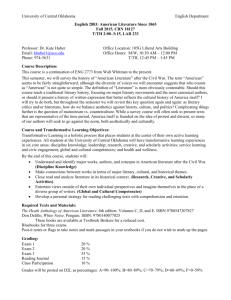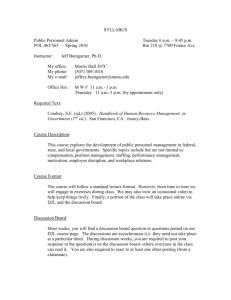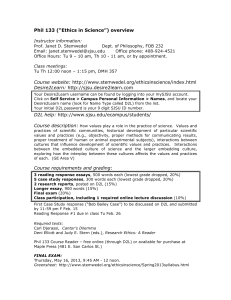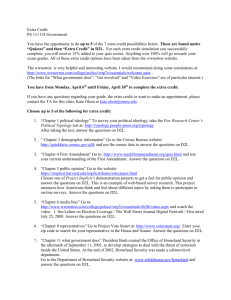American Literature to 1865 Fall 2014, CRN 16347 T/TH 11:00–12
advertisement
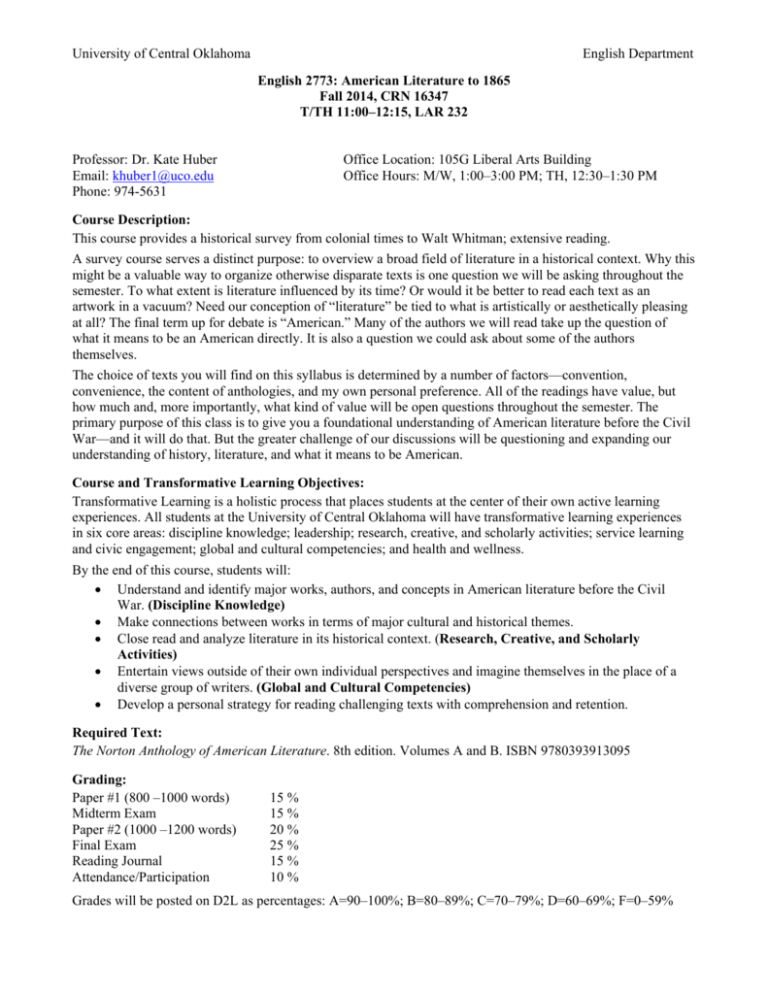
University of Central Oklahoma English Department English 2773: American Literature to 1865 Fall 2014, CRN 16347 T/TH 11:00–12:15, LAR 232 Professor: Dr. Kate Huber Email: khuber1@uco.edu Phone: 974-5631 Office Location: 105G Liberal Arts Building Office Hours: M/W, 1:00–3:00 PM; TH, 12:30–1:30 PM Course Description: This course provides a historical survey from colonial times to Walt Whitman; extensive reading. A survey course serves a distinct purpose: to overview a broad field of literature in a historical context. Why this might be a valuable way to organize otherwise disparate texts is one question we will be asking throughout the semester. To what extent is literature influenced by its time? Or would it be better to read each text as an artwork in a vacuum? Need our conception of “literature” be tied to what is artistically or aesthetically pleasing at all? The final term up for debate is “American.” Many of the authors we will read take up the question of what it means to be an American directly. It is also a question we could ask about some of the authors themselves. The choice of texts you will find on this syllabus is determined by a number of factors—convention, convenience, the content of anthologies, and my own personal preference. All of the readings have value, but how much and, more importantly, what kind of value will be open questions throughout the semester. The primary purpose of this class is to give you a foundational understanding of American literature before the Civil War—and it will do that. But the greater challenge of our discussions will be questioning and expanding our understanding of history, literature, and what it means to be American. Course and Transformative Learning Objectives: Transformative Learning is a holistic process that places students at the center of their own active learning experiences. All students at the University of Central Oklahoma will have transformative learning experiences in six core areas: discipline knowledge; leadership; research, creative, and scholarly activities; service learning and civic engagement; global and cultural competencies; and health and wellness. By the end of this course, students will: Understand and identify major works, authors, and concepts in American literature before the Civil War. (Discipline Knowledge) Make connections between works in terms of major cultural and historical themes. Close read and analyze literature in its historical context. (Research, Creative, and Scholarly Activities) Entertain views outside of their own individual perspectives and imagine themselves in the place of a diverse group of writers. (Global and Cultural Competencies) Develop a personal strategy for reading challenging texts with comprehension and retention. Required Text: The Norton Anthology of American Literature. 8th edition. Volumes A and B. ISBN 9780393913095 Grading: Paper #1 (800 –1000 words) Midterm Exam Paper #2 (1000 –1200 words) Final Exam Reading Journal Attendance/Participation 15 % 15 % 20 % 25 % 15 % 10 % Grades will be posted on D2L as percentages: A=90–100%; B=80–89%; C=70–79%; D=60–69%; F=0–59% 2 Course Requirements: The requirements for this course will include two papers, two exams, and a reading journal. The exams will test your broader understanding of the texts, historical periods, and key issues discussed in class through shortanswer identifications. The final exam will also include a longer essay question. The papers will require more original analysis as you develop your own arguments supported by close reading. I will give you more detailed information and directions before each major assignment. The reading journal is described below. The remaining portion of your grade will cover attendance, participation, and any in-class writing. This grade will reflect your engagement with class discussion. To be an active participant in the class, it is essential that you complete the assigned readings for each day and come to class ready to talk about them. I may begin some classes with short response questions to help you gather your thoughts about the assigned works and to make sure that everyone has read thoroughly and carefully. Bring your anthology to each class period as well as copies of any additional readings posted on D2L. Please also observe common courtesies such as silencing all phones and refraining from texting, social networking, surfing the web, and other distracting activities. Reading Journal: A large and important component of success in this course will be keeping up with the reading. To help you stay on track and to provide feedback, you must make regular entries by posting to your Reading Journal discussion topic on D2L, which only you and I can see. You must post at least 200 words per week. You can meet the requirement with one longer post per week or as many separate posts as you like. You may group your posts into “threads” in whichever way makes the most sense to you. Each week you should: Respond to a reading question I’ve posed (before we discuss the work in class). Close read a passage (before we discuss the work in class). Pose your own question for further thought and analysis. Reflect on your reading experience. I will give feedback on your reading journal as often as I can, particularly near the beginning of the semester, and I will let you know in my comments if your responses are strong, adequate, or need improvement. Your reading journal will be graded as a whole at the end of the semester. You can find the rubric for this assignment on D2L. Attendance: You are responsible for all material covered at every class session, even if you do not attend that session, and any missed class may put you at a disadvantage. Missing more than three class meetings or coming late to class more than three times will negatively affect your participation grade. Missing more than six class meetings will result in failure of this course. Late Work and Missed Exams: Papers must be submitted to the D2L dropbox by the start of class on the day they are due. I will not accept technological excuses, so have a plan B and make sure to confirm online that your paper has been submitted properly. If there is any doubt, email a copy to me. Late essays will be dropped one third of a letter grade (e.g. B to B-) for each day (not each class period) they are late. I will only give make-up exams in the case of a genuine emergency. Contact me immediately to make alternate arrangements. Learn@UCO (D2L): Most course materials including additional readings, the syllabus, and assignments (as they are given) can be found on D2L. I will use the “News” widget on the course’s homepage to post important course announcements as well as questions to consider as you write in your reading journal. I suggest that you set your notification settings so that you receive an email whenever a new item is posted. You can also use D2L to keep track of your grades and attendance. 3 Plagiarism: All work that you hand in for this course must be your own. Any language that is not your own must be put in quotation marks and cited using MLA format. Re-worded ideas, opinions, or facts must also be cited. If you do not document the source of any words or ideas that are not your own, I will file a notice of academic dishonesty with the Office of Academic Affairs and you will fail this course. Don’t jeopardize your academic career by plagiarizing. If you are in any way uncertain about what constitutes plagiarism, consult with me. When in doubt, cite. The University of Central Oklahoma subscribes to the turnitin.com plagiarism prevention service. Students agree by taking this course that all required assignments may be subject to submission to turnitin.com for textual similarity review. All submitted assignments will be included as source documents in turnitin.com’s restrictedaccess database for the purposes of detecting plagiarism. Use of the turnitin.com service is subject to the terms and conditions of use posted on the turnitin.com website. Turnitin.com is one of several plagiarism prevention tools and methods that may be used by the instructor. Expectation of Work: Oklahoma State Regents of Higher Education policy states that each college or university student should devote two to three hours to homework, study, and other academic preparation for each hour that he or she spends in class. Special Accommodations: The University of Central Oklahoma complies with Section 504 of the Rehabilitation Act of 1973 and the Americans with Disabilities Act of 1990. Students with disabilities who need special accommodations must make their requests by contacting the Office of Disability Support Services at 974-2516. The Office of Disability Support Services is located in room 309 of the Nigh University Center. Students should also notify the instructor of special accommodation needs by the end of the first week of class. Non-Discrimination Policy: The University is committed to an inclusive educational and employment environment that provides equal opportunity and access to all qualified persons. The University will continue its policy of fair and equal employment and educational practices without discrimination or harassment because of actual or perceived race, creed, color, religion, alienage or national origin, genetic information, ancestry, citizenship status, age, disability or handicap, gender, marital status, veteran status, sexual orientation, gender identity, or any other characteristic protected by applicable federal, state, or local laws. Discrimination or harassment in violation of this policy should be reported to the Affirmative Action Officer (Office of Legal Counsel), Lillard Administration Building, Room 114D, voice (405) 974-3377 or fax (405) 974-3807. After office hours or on holidays and weekends, the report may be made by contacting University Police Services at (405) 974-2345. Additional Policies and Procedures: Please consult the attached “Student Information Sheet and Syllabus Attachment” for information about additional policies and procedures applicable to this class. http://www.uco.edu/academic-affairs/files/aaforms/StudentInfoSheet.pdf 4 COURSE OUTLINE Unless otherwise noted, readings for Unit I are from Volume A of the Norton Anthology of American Literature, 8th ed. Readings for Unit II are from Volume B. Print all readings posted on D2L and bring copies to class. All assignments are due on the day they appear. This schedule may be revised as necessary throughout the semester. Unit I – From Colonial Beginnings to the New Republic Part 1 – Visions of the New World Week 1 T 8/19: Course Introduction Th 8/21: Christopher Columbus, “Letter to Luis de Santangel Regarding the First Voyage,” “Letter to Ferdinand and Isabella Regarding the Fourth Voyage,” 35-38. On D2L: Journal of the First Voyage of Columbus extracts. Week 2 T 8/26: John Smith, The General History of Virginia (Chapter 2), 83-92. John Winthrop, “A Model of Christian Charity,” 166-177. Th 8/28: Roger Williams, A Key into the Language of America, 194-204. Week 3 T 9/2: Mary Rowlandson, A Narrative of the Captivity and Restoration of Mrs. Mary Rowlandson, 257288. Th 9/4: “The Iroquois Creation Story,” 23-25. Logan / Thomas Jefferson, “Chief Logan’s Speech,” 449-450. On D2L: Samson Occom, A Short Narrative of My Life. Part 2 – What is an American? / Republican Promise and Peril Week 4 T 9/9: Benjamin Franklin, The Autobiography (Parts One and Two), 481-542. Th 9/11: Phillis Wheatley, “On Being Brought from Africa to America,” “To the Right Honourable William . . . ,” “To the University of Cambridge . . . ,” 764-766. Week 5 T 9/16: On D2L: J. Hector St. John de Crèvecoeur, Letters from an American Farmer, “Letter III: What is an American.” J. Hector St. John de Crèvecoeur, Letters from an American Farmer, “Letter XII: Distresses of a Frontier Man,” 620-625. Th 9/18: Paper #1 Due; The Federalist, No. 10, 681-686. Week 6 T 9/23: Hannah Webster Foster, The Coquette, 818-916. Th 9/25: Foster, cont. Week 7 T 9/30: Midterm Exam Unit II – “The American Renaissance” Part 1 – The Transcendentalists Th 10/2: Ralph Waldo Emerson, Nature (Introduction–Chapter III), 214-223. Ralph Waldo Emerson, “Self-Reliance,” 269-286. Week 8 T 10/7: Henry David Thoreau, Walden, “Economy,” 981-1022. Th 10/9: Henry David Thoreau, Walden, “Where I Lived . . . ,” 1023-1033. Henry David Thoreau, Walden, “Sounds,” 1039-1048. 5 Part 2 – Questioning the “Literary”: Gender, Genre, and Popularity Week 9 T 10/14: Margaret Fuller, “The Great Lawsuit,” 743-777. Fanny Fern, “Aunt Hetty on Matrimony,” “Hungry Husbands,” 907-908. Th 10/16: No Classes Week 10 T 10/21: Harriet Beecher Stowe, Uncle Tom’s Cabin (Chapters I and IX), 807-814, 828-839. Fanny Fern, Ruth Hall (Chapters LIV and LVI), 916-920. Th 10/23: Lydia Maria Child, “The Quadroons,” 183-190. Week 11 T 10/28: Nathaniel Hawthorne, “Young Goodman Brown,” 386-395. Nathaniel Hawthorne, “Rappaccini’s Daughter,” 430-450. Th 10/30: Edgar Allan Poe, “The Black Cat,” 695-701. On D2L: Edgar Allan Poe, “The Scythe of Time.” Part 3 – Slavery: Escape and Insurrection Week 12 T 11/4: Frederick Douglass, Narrative of the Life of Frederick Douglass, 1174-1235. Th 11/6: Harriet Jacobs, Incidents in the Life of a Slave Girl (Chapters VII and X), 924-932. Week 13 T 11/11: Herman Melville, “Benito Cereno,” 1526-1582. Th 11/13: Melville, cont. Part 4 – Poetry: Form and Freedom Week 14 T 11/18: Edgar Allan Poe, “The Raven,” 637-640. Edgar Allan Poe, “The Philosophy of Composition,” 719-727. Th 11/20: Lydia Howard Huntley Sigourney, “Death of an Infant,” “The Suttee,” “To the First Slave Ship,” “Columbus before the University of Salamanca,” “Indian Names,” “Slavery,” “To a Shred of Linen,” “Our Aborigines,” “The Two Draughts,” “Fallen Forests,” “Erin’s Daughter,” “Two Old Women,” 108-121. William Cullen Bryant, “Sonnet—To an American Painter . . . ,” “The Prairies,” 126-129. Week 15 T 11/25: Paper #2 Due; Emily Dickinson: 39 (“I never lost as much but twice –”), 1663. 207 (“I taste a liquor never brewed –”), 1667. 236 (“Some keep the Sabbath going to Church”), 1668. 320 (“There’s a certain Slant of light,”), 1672. 340 (“I felt a Funeral, in my Brain,”), 1673. 372 (“After great pain, a formal feeling comes –”), 1677. 466 (“I dwell in Possibility –”), 1682. 479 (“Because I could not stop for Death –”), 1683-1684. 591 (“I heard a Fly buzz – when I died –”), 1685. 620 (“Much Madness is divinest Sense –”), 1687. 764 (“My Life has stood – a Loaded Gun –”), 1691. 788 (“Publication – is the Auction”), 1692. 857 (“She rose to His Requirement – dropt”), 1693. 1096 (“A narrow Fellow in the Grass”), 1694. 1263 (“Tell all the truth but tell it slant”), 1696. Th 11/27: Thanksgiving Break – No Classes 6 Week 16 T 12/2: On D2L: Walt Whitman, [“Song of Myself”] (1855 edition). Th 12/4: Whitman, cont. Finals Week Th 12/11: Final Exam (11:00 AM – 12:50 PM)



